I work to test a class with the Junit and I get an NullPointerException.
The class I would like to test is provided below,
@Component
public class EmailageConnector {
private static final Logger LOG = LoggerFactory.getLogger( EmailageConnector.class );
private static final String BASIC_AUTHORIZATION = "Basic ";
@Autowired
private EmailageConfigHolder emailageConfigHolder;
@Autowired
private EntityServiceConnectable<EmailageResponseDto> connector;
private String authorization;
@PostConstruct
void createAuthorization() {
final String credentials = String.format( "%s%s%s", emailageConfigHolder.getAccountId(), ":", emailageConfigHolder.getApiKey() );
authorization = BASIC_AUTHORIZATION + encodeBase64String( credentials.getBytes() );
}
// ========================================================================
public ServiceResponse<EmailageResponseDto> call( final RequestInformation requestInfo, final EmailageRequestDto request ) {
if( LOG.isDebugEnabled() ) {
LOG.debug( "call emailage [ requestInfo: {} - request: {}]",
String.format( "%s", requestInfo ),
String.format( "%s", request ) );
}
return connector.call( request, createHeaders() );
}
// ========================================================================
private HttpHeaders createHeaders() {
final HttpHeaders headers = new HttpHeaders();
headers.add( AUTHORIZATION, authorization );
return headers;
}
}
This is my test class,
@RunWith( MockitoJUnitRunner.class )
public class EmailageConnectorTest {
@InjectMocks
private EmailageConnector connector;
@Spy
private EmailageConfigHolder configHolder;
@Mock
EntityServiceConnectable<EmailageResponseDto> serviceConnector;
@Captor
private ArgumentCaptor<UriParam<?>> captor;
@Captor
private ArgumentCaptor<HttpHeaders> headerCaptor;
@Before
public void setUp() {
configHolder.setApiKey( "api-key-123456" );
configHolder.setAccountId( "ratepay-group" );
connector.createAuthorization();
}
@Test
public void call() {
RequestInformation requestInfo = new TestRequestInformation();
when( serviceConnector.call( Mockito.any( HttpHeaders.class ), Mockito.any() ) )
.thenReturn( ServiceResponseFactory.withError( "error", 500 ) );
ServiceResponse<EmailageResponseDto> response = connector.call( requestInfo, createTestEmailageRequestDto() );
assertEquals( Integer.valueOf( 500 ), response.getHttpStatus() );
assertEquals( "error", response.getErrorMessage() );
verify( serviceConnector ).call( headerCaptor.capture(), captor.capture() );
assertEquals( 3, captor.getAllValues().size() );
assertEquals( "api_id", captor.getAllValues().get( 0 ).getName() );
assertEquals( "api-id-12345", captor.getAllValues().get( 0 ).getValue() );
assertEquals( "token", captor.getAllValues().get( 1 ).getName() );
assertEquals( "token-1234", captor.getAllValues().get( 1 ).getValue() );
assertEquals( "include", captor.getAllValues().get( 2 ).getName() );
assertEquals( "scores", String.valueOf( ( (SimpleQueryUriParam) captor.getAllValues().get( 2 ) ).getValue()[0] ) );
assertEquals( GW_ID, headerCaptor.getValue().getFirst( HEADER_GATEWAY_REQUEST_ID ) );
assertEquals( TRX_ID, headerCaptor.getValue().getFirst( HEADER_TRANSACTION_ID ) );
assertEquals( "Basic cmF0ZXBheS1ncm91cDphcGkta2V5LTEyMzQ1Ng==", headerCaptor.getValue().getFirst( AUTHORIZATION ) );
}
private EmailageRequestDto createTestEmailageRequestDto() {
EmailageRequestDto dto = new EmailageRequestBuilder().build();
return dto;
}
}
The interface for the EntityServiceConnectable is provided below,
public interface EntityServiceConnectable<RESPONSE> extends ServiceConnectable<RESPONSE> {
ServiceResponse<RESPONSE> call(Object var1, RequestInformation var2, UriParam... var3);
ServiceResponse<RESPONSE> call(Object var1, HttpHeaders var2, UriParam... var3);
ServiceResponse<RESPONSE> call(Object var1, UriParam... var2);
}
The test is failing here,
ServiceResponse<EmailageResponseDto> response = connector.call( requestInfo, createTestEmailageRequestDto() );
Here is the error stack for the test,
java.lang.NullPointerException
at com.ratepay.ella.service.io.EmailageConnectorTest.call(EmailageConnectorTest.java:84)
at sun.reflect.NativeMethodAccessorImpl.invoke0(Native Method)
at sun.reflect.NativeMethodAccessorImpl.invoke(NativeMethodAccessorImpl.java:62)
at sun.reflect.DelegatingMethodAccessorImpl.invoke(DelegatingMethodAccessorImpl.java:43)
at java.lang.reflect.Method.invoke(Method.java:498)
at org.junit.runners.model.FrameworkMethod$1.runReflectiveCall(FrameworkMethod.java:50)
at org.junit.internal.runners.model.ReflectiveCallable.run(ReflectiveCallable.java:12)
at org.junit.runners.model.FrameworkMethod.invokeExplosively(FrameworkMethod.java:47)
at org.junit.internal.runners.statements.InvokeMethod.evaluate(InvokeMethod.java:17)
at org.junit.internal.runners.statements.RunBefores.evaluate(RunBefores.java:26)
at org.junit.runners.ParentRunner.runLeaf(ParentRunner.java:325)
at org.junit.runners.BlockJUnit4ClassRunner.runChild(BlockJUnit4ClassRunner.java:78)
at org.junit.runners.BlockJUnit4ClassRunner.runChild(BlockJUnit4ClassRunner.java:57)
at org.junit.runners.ParentRunner$3.run(ParentRunner.java:290)
at org.junit.runners.ParentRunner$1.schedule(ParentRunner.java:71)
at org.junit.runners.ParentRunner.runChildren(ParentRunner.java:288)
at org.junit.runners.ParentRunner.access$000(ParentRunner.java:58)
at org.junit.runners.ParentRunner$2.evaluate(ParentRunner.java:268)
at org.junit.runners.ParentRunner.run(ParentRunner.java:363)
at org.mockito.internal.runners.DefaultInternalRunner$1.run(DefaultInternalRunner.java:79)
at org.mockito.internal.runners.DefaultInternalRunner.run(DefaultInternalRunner.java:85)
at org.mockito.internal.runners.StrictRunner.run(StrictRunner.java:39)
at org.mockito.junit.MockitoJUnitRunner.run(MockitoJUnitRunner.java:163)
at org.junit.runner.JUnitCore.run(JUnitCore.java:137)
at com.intellij.junit4.JUnit4IdeaTestRunner.startRunnerWithArgs(JUnit4IdeaTestRunner.java:68)
at com.intellij.rt.execution.junit.IdeaTestRunner$Repeater.startRunnerWithArgs(IdeaTestRunner.java:47)
at com.intellij.rt.execution.junit.JUnitStarter.prepareStreamsAndStart(JUnitStarter.java:242)
at com.intellij.rt.execution.junit.JUnitStarter.main(JUnitStarter.java:70)
[MockitoHint] EmailageConnectorTest.call (see javadoc for MockitoHint):
[MockitoHint] 1. Unused... -> at com.ratepay.ella.service.io.EmailageConnectorTest.call(EmailageConnectorTest.java:79)
[MockitoHint] ...args ok? -> at com.ratepay.ella.service.io.EmailageConnector.call(EmailageConnector.java:65)
I debugged the setup and provided the screenshot below,
What do I miss here?
